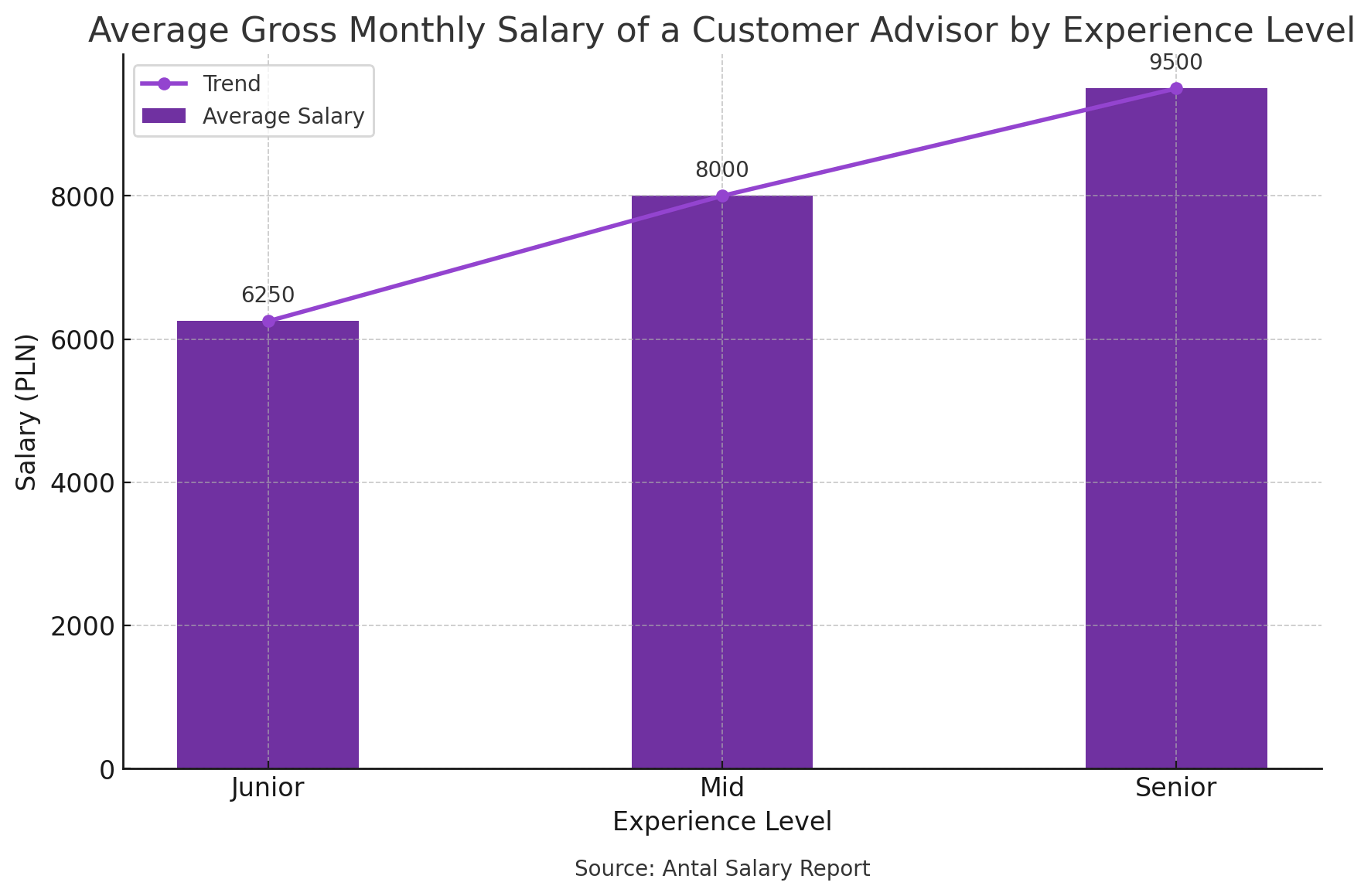Customer Advisor: Responsibilities and Expected Earnings
Table of contents
In the dynamically evolving corporate world, the role of a customer advisor has become an indispensable pillar for every company, serving as the first point of contact with the client. This position, often changing its title, combines not only communication skills but also the ability to solve problems and adapt in diverse environments. For many young professionals, it is the first step on their career path, opening doors to further development and specialization. What exactly does a customer advisor do, and what development opportunities does this role offer?
Customer Advisor - what is this position?
The position of a customer advisor, which often takes various names depending on the company's profile, is one of the most common roles in globally operating companies. In international corporate environments, especially in modern business services such as shared services centers, this role is often referred to as Customer Service, Customer Advisor, Customer Support Advisor, or Customer Support Associate. Here, you are the main and often the only point of contact between the customer and the company. You act as an intermediary who must balance the company's needs with the expectations of external entities. Your job involves advising, supporting, and addressing customer needs. Working in this area is often the first step towards further career development and an opportunity to significantly improve your language skills, learn multitasking, and acquire new competencies that will allow you to continue progressing in your professional path.
Technologies and tools
SAP
is a common tool used in the customer service/advisor area. Many companies have their internal ERP systems often used in customer interactions. The aforementioned SAP offers many solutions – various plugins and modules can be used, increasing the range of possibilities. Similarly, Oracle is another tool used in customer service. However, when it comes to technical or tool-related skills, such skills are not a "must-have" for this type of position. Here, essential soft skills include high communication ability, openness, a growth-oriented attitude, and motivation to work in a dynamic environment. You simply need to enjoy working with customers and be aware that this job is not for everyone. Certainly, it is not suitable for someone with an analytical mindset.
Motivation in the customer service field plays a crucial role. Moving forward, the most essential skill needed for working with customers is a very good command of languages.
English
is an absolute minimum. Usually, a B2 level is sufficient for smooth communication within the team or as a "backup" for the main language. By "main language," we mean German, French, Italian, or Spanish (including Dutch, Scandinavian languages, or Hungarian). In this case, individuals with a C1 level or higher are most successful. This is due to working with a specific client assigned to a particular region. The higher the level of the main language, the greater the ease of working in customer service. Individuals proficient in using computers, familiar with the MS Office environment, and highly engaged in their work do very well in customer service. These must be individuals who are not afraid of talking to people.
Scope of responsibilities
The primary scope of responsibility for this position includes comprehensive customer service through three communication channels: chat, email, and incoming calls. Frequently encountered tasks include resolving customer issues, such as handling complaints, unpaid invoices, delayed flights, and providing support for the company's product and service portfolio. It is worth noting that "Customer Service" is not always the same. It is not always a typical call center; often, it involves extensive collaboration with external customers and quick, appropriate responses to escalating issues. An important process in this context is order management. Sometimes companies hire individuals for customer service, but in practice, these individuals handle invoicing, supply chain management, entering appropriate notes into the system, and working with SAP. Common tasks as customer support also include administrative procedures (managing databases, modifying orders), managing customer claims, and collaborating with other departments.
What projects do they work on?
In essence, there are as many customer service projects as there are companies. Simply put, each company handles different processes and focuses on different areas. More precisely, commonly encountered customer service projects involve airlines, banking and financial instruments, household and electronic appliances, specific technological products, tourism, applications, etc. Additionally, there are external entities. Working in a corporate customer service position, you are dedicated to a specific market based on language proficiency or experience. There is a high level of change dynamics – you may be shifted from one project to another or be responsible for the area with the greatest demand at the moment. If you know two foreign languages, you can often rotate with a colleague from another team during their absence to ensure continuity of customer support processes. Currently, in Poland, the highest demand is for the German-speaking market – DACH (Austria, Switzerland, Germany). Following this are the French-, Spanish-, and Italian-speaking markets.
Customer Advisor - salaries
Earnings are a function of experience. Starting a career in customer service, you can expect earnings in the range of 6-6.5 thousand PLN gross. Naturally, the salary increases with the level of "seniority" and language proficiency. The salary ranges differ for the most popular European languages, for rarer ones (the difference can be up to 1,000 PLN gross), and for roles only with English.

Specialists earn up to around 7.5-8.5 thousand PLN, seniors up to around 9-10 thousand PLN. Additionally, there are monthly sales bonuses for meeting KPI targets and annual bonuses. The latter range from a few to several percent. Not to mention the benefits that often make the mentioned additions significantly increase the real value of the salary. However, it should be emphasized that the salary is a function of many market variables and the budget that the client has and their preferences regarding the individuals needed for the position.














